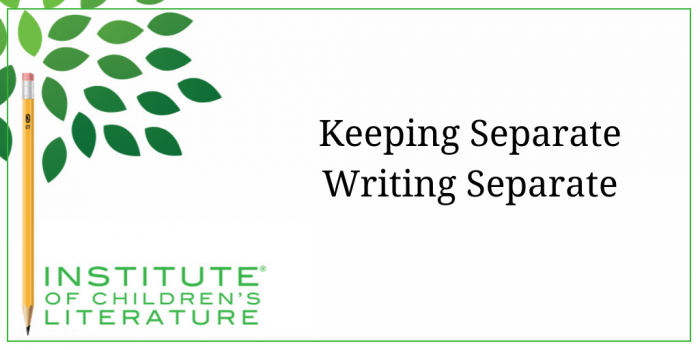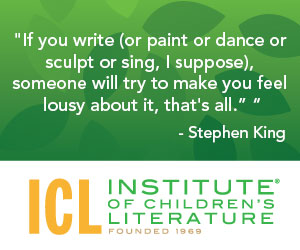1000 N. West Street #1200, Wilmington, DE 19801
© 2024 Direct Learning Systems, Inc. All rights reserved.
Beginning Tuesday, July 22, 2025 at 10 PM CT through Wednesday, July 23, 2025 at 4 AM CT, we will be performing scheduled maintenance to update our website.

We teach our students how to write and get published!
View our Course Catalog >

First Things First
Most parents don’t really care whether you write books other than children’s books as long as their children aren’t likely to accidentally run into one of those books, think it’s a kid’s book, and read it. And that tends to be unlikely even if you write both your children’s books and your adult books under the same name. Children who read picture books aren’t likely to assume this paperback novel with two scantily clad adults in a clench is interesting at all.
Now, teens may cross over and look for a writer’s adult books but most children will not. That doesn’t mean you shouldn’t take precautions, but it does mean you’re not likely to be in for a barrage of hate mail because Little Benji confused A Very Silly Alligator with Taming Torrid Tonya. However, unlikely doesn’t mean it never happens.
One very famous example was when Judy Blume (who wrote extremely popular middle grade novels) decided to tackle an edgy young adult novel about grief. The book ended up in the hands of many young readers who weren’t quite ready for the raw edges of the story and parents were furious. Since both the middle grade works and the young adult book were novels with non-adult protagonists, there simply was too much room for confusion and Tiger Eyes created problems for the writer and the publisher. Basically, the one thing you need to think about is this: will I be courting confusion?
Now, having said that, there are situations where your writing of one thing will affect your acceptance in another area. If you write erotica and children’s Christian fiction, you really do need to keep both things very separate. A Christian publisher is not going to be willing to sign you if you there is any chance the parents of the children ever come to know you write erotica. So if you’re writing in a genre where the audience links the character of the writer with the types of books he/she writes and buys based on that belief, that can result in problems. But most of us aren’t writing at quite those extremes.
Second Things Next
So the second thing you need to ask is “would knowing I write both things upset people?” Mostly people don’t upset easily when it comes to the breadth of a writer’s body of work, but it’s worthwhile to think about this question.
The Name’s the Thing
The easiest way to keep your books separate is simply to write them under different names. This comes with certain problems (mostly connected to promotion) but will mean your adult romance novels and your children’s books never meet. Some writers will actually choose a new name any time they change genre, simply to keep the different kinds of books separate. The name changes can be slight or extreme. A writer might write horror as Joe Smith and literary novels as Joseph Smithfield and hard-boiled detective novels as J.D. Schmitt. Or equally a writer might write erotica as Kiki Desire, cozy mysteries as K.R. Bloom, and picture books as Kay Mayor. Having totally different names puts you in totally different places on a bookshelf, even if a store or library doesn’t break out books by genre.
Now, these would be simple pseudonyms and you would inform the publisher right up front that the book is by Joe Smith, writing as Joseph Smithfield. The publisher would put the pseudonym on the novel’s cover and your real name on your checks. You would sign all your contracts with your real name. You would bank all the checks with your real name. It wouldn’t involve any kind of legal machinations at all. It is very rare for a writer to want to keep their real identity so separate that they set up a totally separate identity. If you feel that is necessary, you would to act with the help and advice of a lawyer.
Promotion, Promotion, Promotion
Promotion is another spot where you need to decide where and when it’s safe to cross the streams. If you’re a writer who benefits from or has a lot of direct contact with the children who read your books (or parents focused on finding a good book for their children), it makes sense to set up a totally separate children’s writer online presence. This keeps children from becoming confused about which books will appeal to them and which will not.
On the Institute Facebook page, ICL instructor Susan Uhlig Ford explained how she handles it, “I write both for children and adults and have a children’s writing website: www.susanuhlig.com and an adult website: www.smfordbooks.com. The former does not mention the adult writing. The adult writing website mentions the children’s writing. I have twitter accounts that are separate. I have a Facebook page for my adult writing, but not for my children’s writing.” As you can see, Sue uses variations on her actual name to help keep her children’s writing separate.
A real-life example of more extreme pseudonym choices would be Dottie Enderle who has picture books and other children’s books under “Dottie Enderle” (including a historical fiction novel from Calkins Creek), and young adult books under the name “Dax Varley.” She makes no effort to keep most people from knowing that she is both Dottie and Dax, but using the separate names helps keep the two very different kinds of writing separate. One interesting thing about Dottie’s separate “identities” is that her Dottie Enderle website openly says she writes her young adult books as “Dax Varley.” But her Dax Varley site never mentions Dottie Enderle. In this instance, teens can be sensitive about reading an author of kiddie books, so the Dax Varley identity keeps them thinking of her as a writer of thrilling and often scary books. Dax also has a twitter feed since Twitter is popular with her reading age group.
So the moral of the story is don’t panic if you write wildly varied things. Instead, consider using your author name to help readers find the material that will interest them most and avoid confusion. One kind of book is unlikely to “taint” another, but by keeping some kind of separation between your books, you’ll make it easier to build a following and gain devoted readers—and don’t we all want that?
With over 100 books in publication, Jan Fields writes both chapter books for children and mystery novels for adults. She’s also known for a variety of experiences teaching writing, from one session SCBWI events to lengthier Highlights Foundation workshops to these blog posts for the Institute of Children’s Literature. As a former ICL instructor, Jan enjoys equipping writers for success in whatever way she can.
1000 N. West Street #1200, Wilmington, DE 19801
© 2024 Direct Learning Systems, Inc. All rights reserved.
1000 N. West Street #1200, Wilmington, DE 19801
© 2024 Direct Learning Systems, Inc. All rights reserved.
1000 N. West Street #1200, Wilmington, DE 19801
© 2024 Direct Learning Systems, Inc. All rights reserved.
1000 N. West Street #1200, Wilmington, DE 19801
© 2025 Direct Learning Systems, Inc. All rights reserved.
1000 N. West Street #1200, Wilmington, DE 19801
©2025 Direct Learning Systems, Inc. All rights reserved. Privacy Policy.